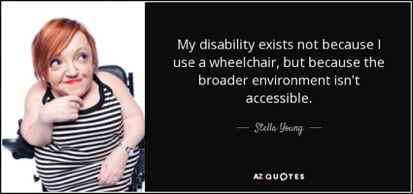While announcing the government will spend $527 million on the Disability Royal Commission Prime Minister Scott Morrison said, “We have to establish a culture of respect for people living with disabilities…” That is a given. People advocating for people with disabilities have long fought for that very same thing.

The good news (sort of…)
It is probably timely to remember that words matter when referring to any person. Language is powerful and can show respect or otherwise. We have fortunately come a long way from the days when it was acceptable to use highly offensive terms such as ‘retard’ and ‘spastic’ when referring to a person with a disability. However, we have still got a long way to go.
Disabled as a collective
While the more respectful term ‘people with a disability’ is now being used widely, the unfortunate phrase ‘the disabled’ still keeps raising its ugly head. We dehumanise people when we group them together like this.
There are 4.3 million (or 18.3%)[1] Australian living with a disability. This can be physical, mental, intellectual, sensory or psychological or a combination. Compare that with the 50% of Australians who will be diagnosed with some form of cancer sometime in their life[2]. It is probably fair to say, that they too will be living with an impairment of sorts while they are being treated for cancer. We don’t categorise them! Could you image grouping them under a collective term such ‘cancerous’? It’s unthinkable. They continue to remain individuals with a name and personality. It should be the same for a person with a disability.
Social Model of Disability
“That quote, ‘the only disability in life is a bad attitude’, [is rubbish] no amount of smiling at a flight of stairs has ever made it turn into a ramp.”
Stella Young
The way we refer to people living with a disability goes only a part of the way of establishing a culture of respect. We should understand the social model of disability. This model came out of the UK in the 1980s and argues that it is not the individual who has a disability, but the rest of society that disables them by the barriers it erects to keep people with a disability out. These barriers are not necessarily intentional but include the way our communities are designed and built to the attitude of the rest of the population.
Disability doesn’t make you exceptional
People with a disability can achieve many things if given the opportunity. When they do, the rest of the population see it as something incredible. The late Stella Young, an Australian, an advocate for people with a disability and who used a wheelchair, gave a very good speech on Ted Talk entitled “I am not your Inspiration, Thank You Very Much”. In it, she refers to ‘inspiration porn and the objectification of disability for the benefit of non-disabled people”. It is worth watching. Here is the link. https://www.youtube.com/watch?v=SxrS7-I_sMQ.
No matter what the outcome of the Royal Commission is, there is no argument that we have to build a culture of respect for people with a disability. If we don’t, all those millions spent on the Royal Commission will be wasted and we will be going down the same path in a few years’ time.
[1]Australian Bureau of Statistics https://www.abs.gov.au/ausstats/[email protected]/0/2068E1189BBD3165CA25778900119E90?Opendocument
[2]https://www.abs.gov.au/ausstats/[email protected]/0/C258C88A7AA5A87ECA2568A9001393E8?Opendocument

